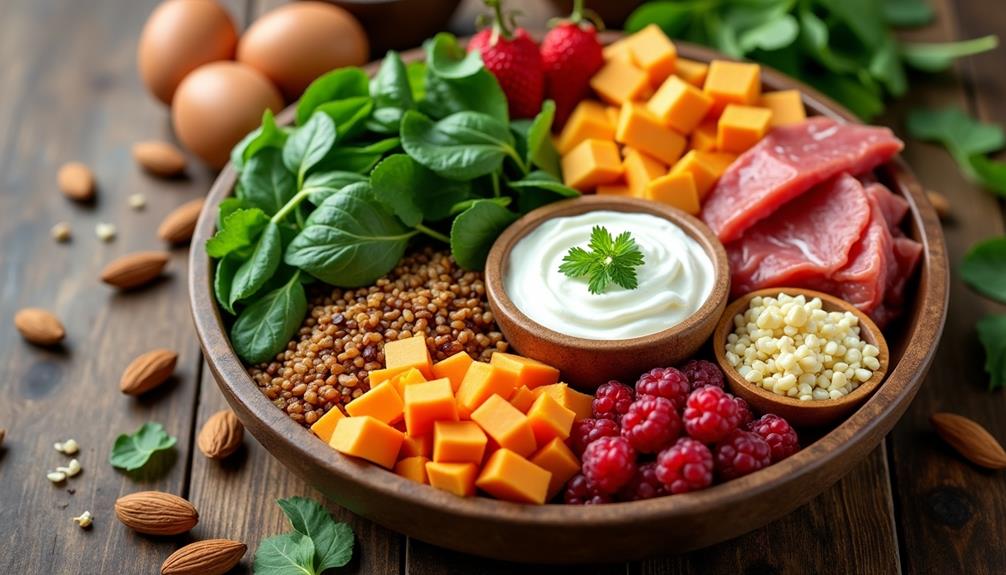To support muscle repair after lifting, focus on these essential foods. First, lean chicken breast provides high-quality protein. Next, quinoa and sweet potatoes offer complex carbohydrates and essential nutrients. Greek yogurt and salmon bring in protein and healthy fats. Don't forget eggs and cottage cheese, packed with amino acids for recovery. Incorporate almonds for protein and healthy fats, and add berries for their antioxidants, aiding inflammation reduction. Eating these foods creates a balanced intake, fueling your body effectively post-workout. For a deeper exploration into each food's benefits and more options, keep exploring what's best for your recovery journey.
Core Insights
- Lean chicken breast provides high-quality protein essential for muscle repair and growth after lifting.
- Greek yogurt is rich in protein and probiotics, aiding digestion and muscle recovery.
- Salmon is packed with omega-3 fatty acids, which help reduce inflammation and support muscle recovery.
- Quinoa offers complex carbohydrates and protein, fueling your body and aiding in muscle repair post-workout.
- Berries, like blueberries and strawberries, are high in antioxidants, helping to combat oxidative stress from intense workouts.
Lean Chicken Breast
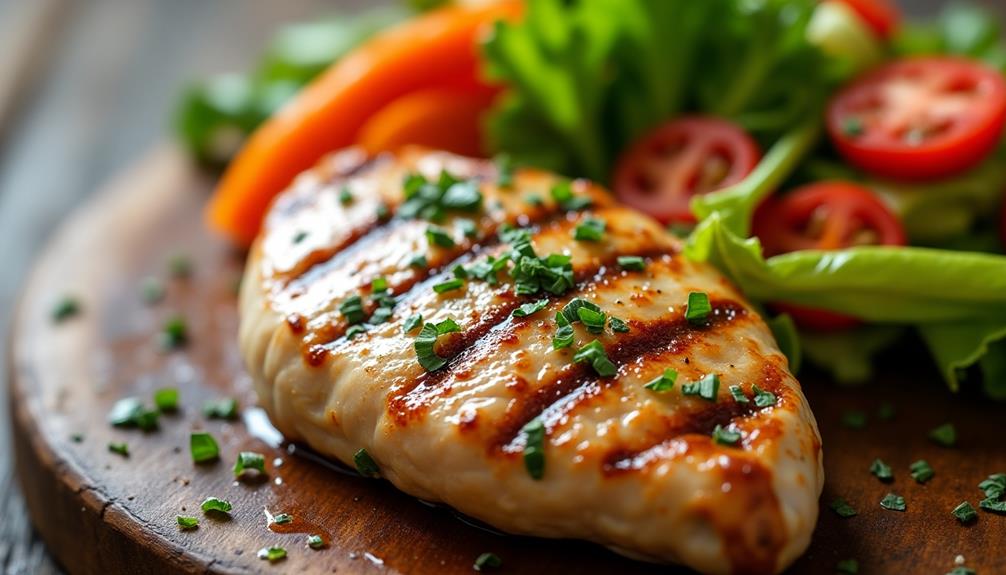
When it comes to muscle repair, lean chicken breast stands out as a top choice. It's packed with high-quality protein, which is essential for rebuilding muscle fibers after a workout. Each 3-ounce serving provides about 25 grams of protein, making it an excellent option for post-exercise recovery. While chicken breast is a great source of protein, some athletes may prefer to supplement with grass-fed whey protein for its additional nutritional benefits and ease of consumption.
In addition to protein, chicken breast is low in fat, which helps you maintain a balanced diet without excess calories. It's also versatile; you can grill, bake, or stir-fry it, allowing you to incorporate it into various meals.
To maximize muscle repair, consider pairing your chicken with a source of carbohydrates, like sweet potatoes or brown rice. This combination will replenish your energy stores while supporting your body's recovery process effectively.
Quinoa
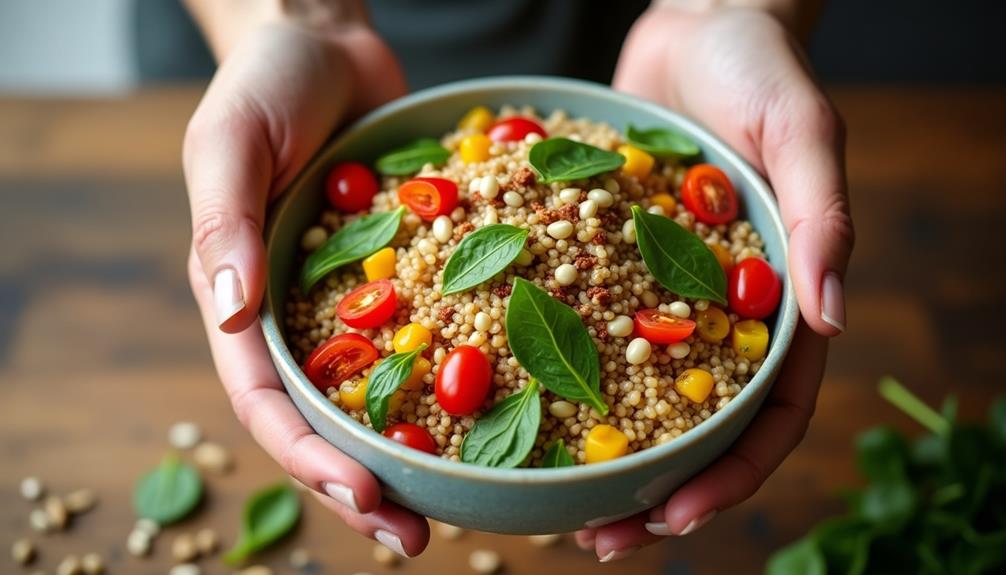
Quinoa is another fantastic food choice for muscle repair, especially for those looking for a plant-based option. This superfood is packed with essential nutrients that help your body recover after lifting. It's a complete protein, meaning it contains all nine essential amino acids your muscles need for repair and growth. Similar to plant-based protein powders, quinoa offers a gluten-free, nutrient-dense option for those with dietary restrictions or preferences.
Here are four reasons to incorporate quinoa into your post-workout meals:
- High Protein Content: Quinoa offers about 8 grams of protein per cup, supporting muscle synthesis.
- Rich in Fiber: Fiber aids digestion and helps maintain energy levels, keeping you fueled.
- Vitamins and Minerals: It's loaded with magnesium, iron, and B vitamins, which are critical for recovery.
- Versatile Ingredient: You can enjoy quinoa in salads, bowls, or as a side dish, making it easy to include in your diet.
Greek Yogurt
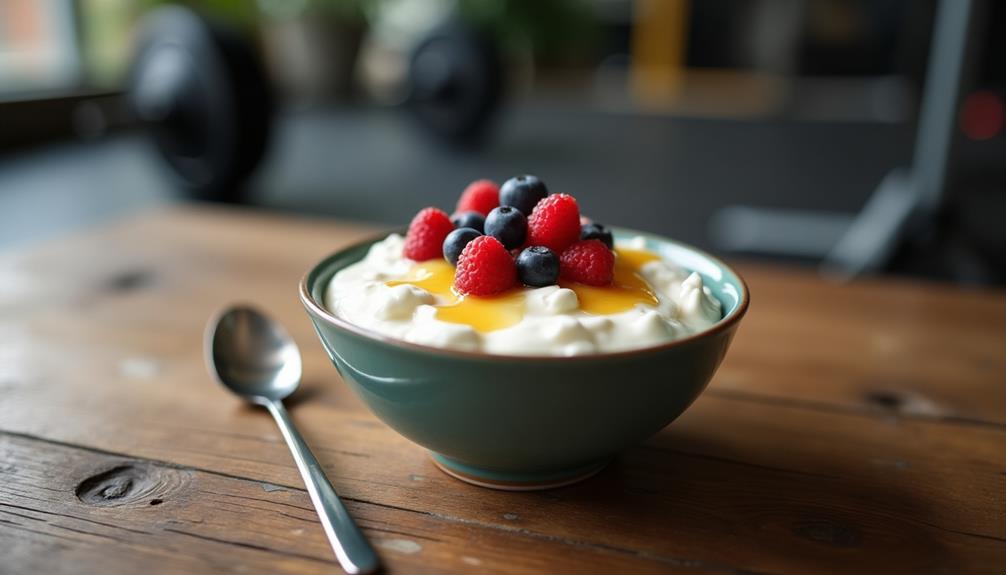
Here's a quick overview to highlight its benefits:
| Nutrient | Benefit |
|---|---|
| Protein | Supports muscle recovery |
| Calcium | Strengthens bones |
| Probiotics | Enhances gut health |
| Vitamins B6 & B12 | Aids in energy production |
Incorporating Greek yogurt into your meals, like smoothies or as a topping for fruits, can guarantee you're fueling your body effectively post-exercise. Enjoy it regularly for the best results!
Salmon
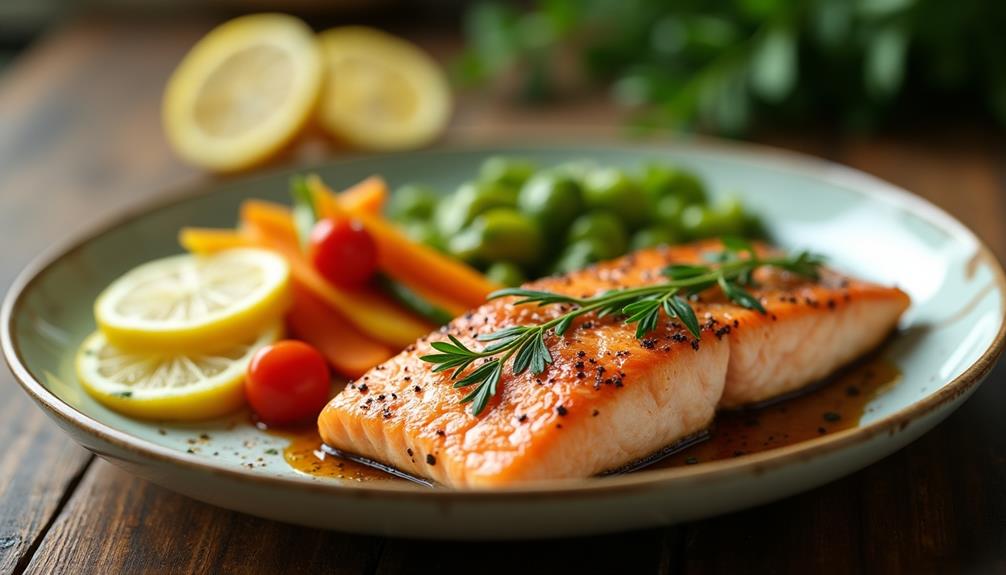
Greek yogurt is a fantastic source of protein, but if you're looking for another powerhouse for muscle repair, salmon should be on your radar. This fatty fish is loaded with essential nutrients that promote recovery after lifting. Not only does it provide high-quality protein, but it's also rich in omega-3 fatty acids, which help reduce inflammation and muscle soreness. Salmon is particularly beneficial for men looking to boost testosterone naturally, as its nutrient profile supports hormone production and overall health.
Here are four reasons to include salmon in your post-workout meal:
- Protein Boost: Salmon delivers about 22 grams of protein per 3-ounce serving.
- Omega-3 Fatty Acids: These healthy fats support muscle recovery and reduce inflammation.
- Vitamin D: Essential for bone health and muscle function.
- B Vitamins: They assist in energy production and metabolism.
Including salmon can greatly enhance your recovery process.
Eggs

When it comes to muscle repair, eggs should definitely be on your plate. Rich in high-quality protein, they provide essential amino acids that help rebuild muscle tissue after lifting. Each egg contains about 6 grams of protein, making them a convenient option for post-workout nutrition.
Additionally, eggs are packed with vitamins and minerals like B12 and selenium, which support overall recovery. The healthy fats found in egg yolks also play a role in hormone production, essential for muscle growth.
Whether scrambled, boiled, or poached, incorporating eggs into your meals can enhance your recovery process. Pair them with whole grains or veggies for a balanced dish that fuels your body. Make eggs a staple in your post-workout routine for best results.
Spinach

In addition to eggs, spinach is another powerhouse food that can aid in muscle repair. Packed with essential nutrients, spinach supports recovery after lifting. Its high antioxidant content helps reduce inflammation, while its rich supply of vitamins and minerals promotes overall health.
Here are four key benefits of incorporating spinach into your post-workout meals:
- Rich in Iron: Spinach provides iron, essential for oxygen transport in your muscles.
- High in Magnesium: This mineral helps with muscle function and recovery.
- Loaded with Vitamins: Spinach is abundant in vitamins A, C, and K, supporting your immune system.
- Hydration Support: With high water content, it helps keep you hydrated post-exercise.
Adding spinach to your diet can enhance your muscle repair process effectively.
Cottage Cheese

Cottage cheese is an important option for muscle repair, offering a perfect blend of protein and essential nutrients. It's rich in casein, a slow-digesting protein that helps provide your muscles with a steady supply of amino acids. This is vital for recovery after intense workouts.
Additionally, cottage cheese contains calcium, which supports muscle function and bone health. You can easily incorporate it into your diet by enjoying it as a snack, mixing it with fruits, or adding it to smoothies.
Don't forget to look for low-fat or fat-free options if you're watching your calorie intake. With its versatility and nutritional benefits, cottage cheese is an excellent choice for anyone looking to enhance muscle recovery effectively.
Sweet Potatoes
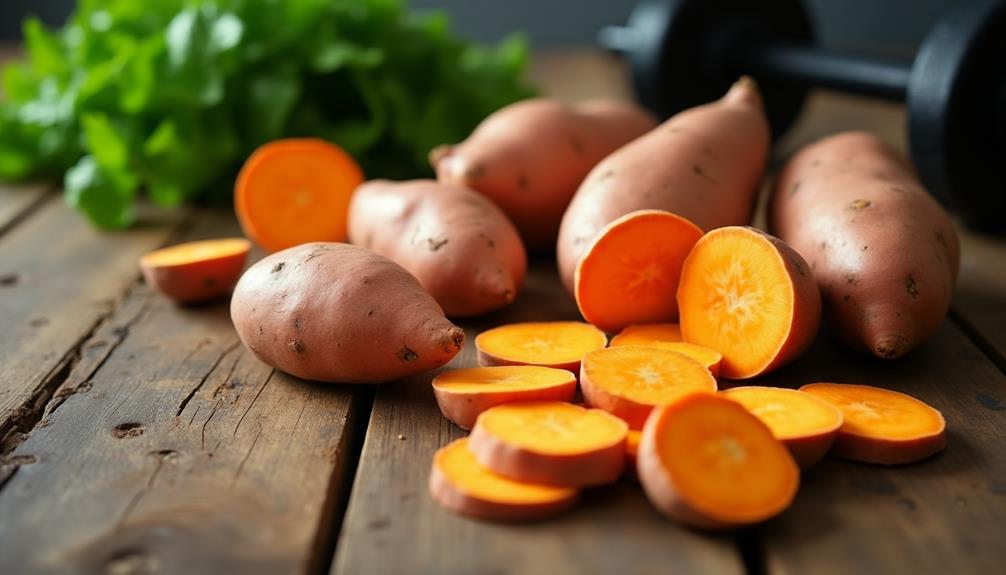
Sweet potatoes are an excellent addition to your diet for muscle repair, packed with vitamins and minerals that support recovery. They're rich in carbohydrates, which replenish glycogen stores after your workouts. Plus, their high fiber content aids digestion.
Here are four key benefits of including sweet potatoes in your post-lifting meals:
- Rich in Antioxidants: They contain beta-carotene, which helps reduce inflammation and oxidative stress.
- High in Potassium: This mineral is vital for muscle function and helps prevent cramping.
- Natural Energy Source: The carbs provide sustained energy for recovery.
- Vitamins and Minerals: Sweet potatoes are loaded with vitamins A, C, and B6, essential for overall health.
Incorporating them into your meals can greatly enhance your recovery process.
Almonds
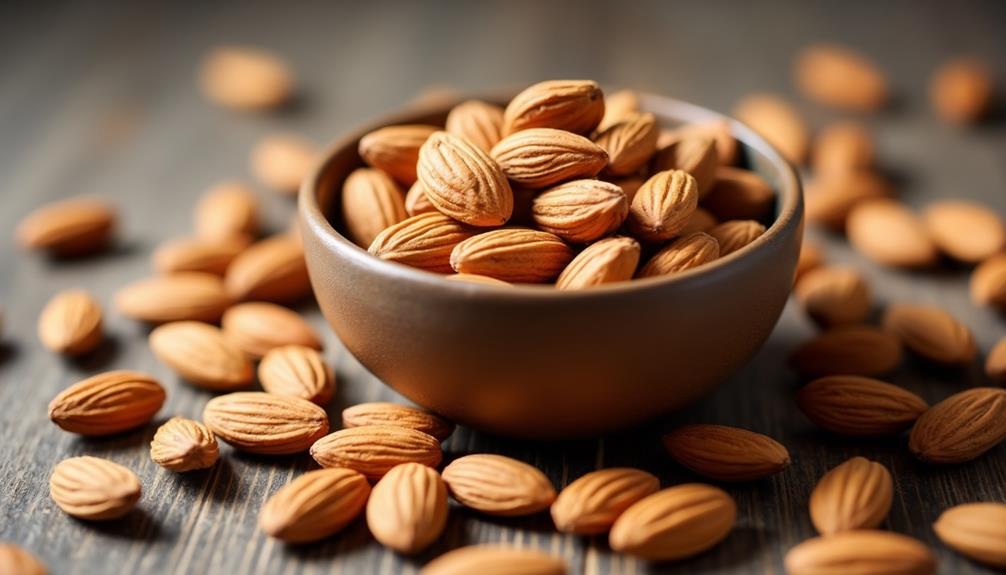
After you've fueled your body with sweet potatoes, consider adding almonds to your post-workout nutrition. Almonds are an excellent source of protein and healthy fats, making them a perfect choice for muscle repair. They provide essential nutrients that help reduce inflammation and support recovery.
Here's a quick comparison of almond nutrition:
| Nutrient | Amount (per 1 oz) |
|---|---|
| Protein | 6 grams |
| Healthy Fats | 14 grams |
| Fiber | 3.5 grams |
| Vitamin E | 7.3 mg |
| Magnesium | 76 mg |
Incorporating almonds into your diet can enhance your recovery process. Enjoy them as a snack, add them to smoothies, or sprinkle them on salads for an extra boost.
Berries
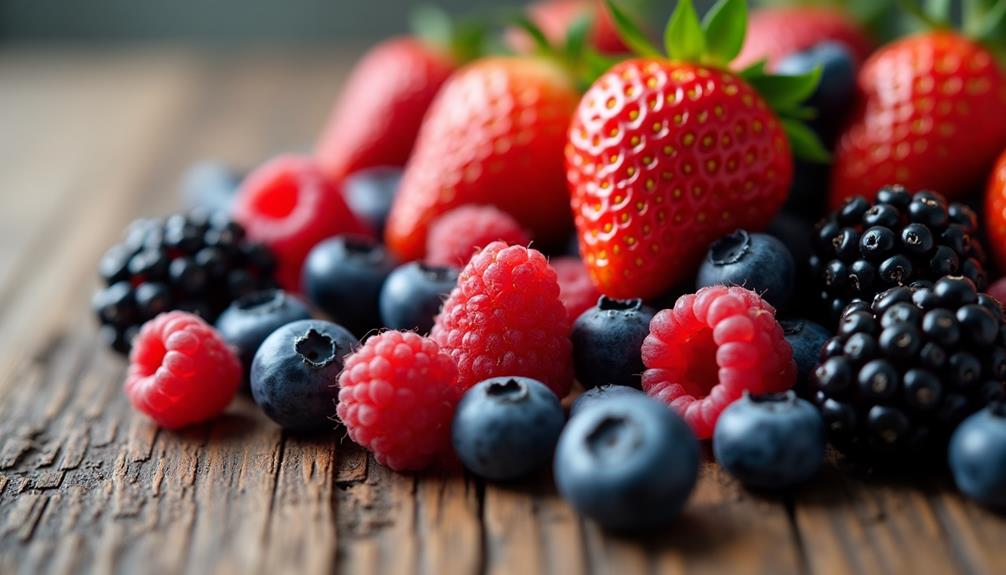
Berries are a powerhouse of antioxidants that can greatly aid in muscle repair and recovery. Packed with vitamins and nutrients, they help reduce inflammation and promote healing after intense workouts. Including a variety of berries in your post-lifting meal can enhance your recovery process.
Here are four benefits of incorporating berries into your diet:
- Rich in Antioxidants: They combat oxidative stress caused by exercise.
- Anti-Inflammatory Properties: Berries can help reduce soreness and swelling.
- Natural Sugars: They provide a quick source of energy for recovery.
- Hydration: Many berries have high water content, assisting in hydration.
Frequently Asked Questions
How Much Protein Do I Need for Muscle Repair?
You need about 20-30 grams of protein after workouts for best muscle repair. This amount helps your muscles recover, rebuild, and grow stronger. Adjust based on your weight, activity level, and fitness goals.
Can I Substitute These Foods With Plant-Based Options?
Absolutely, you can substitute those foods with plant-based options! Studies show that plant-based diets can provide sufficient protein for muscle repair. Just make sure you balance your meals with legumes, nuts, and whole grains for best possible recovery.
When Is the Best Time to Eat These Foods Post-Workout?
You should eat post-workout foods within 30 minutes to two hours after exercising. This timeframe maximizes muscle recovery and replenishes glycogen stores, helping you feel energized and ready for your next workout session.
Are There Any Foods to Avoid After Lifting Weights?
After lifting, think of your body as a car needing premium fuel. Avoid sugary snacks and processed foods; they can derail recovery. Stick to whole, nutrient-dense options that help your muscles thrive and repair efficiently.
How Do Hydration Levels Affect Muscle Recovery?
Hydration levels greatly impact muscle recovery. When you're well-hydrated, your muscles repair faster, reducing soreness. Dehydration can hinder nutrient transport and increase fatigue, so drink plenty of water to support your recovery process effectively.

